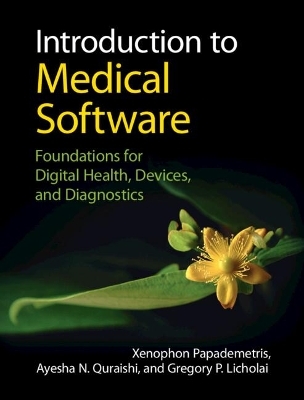
Introduction to Medical Software
Cambridge University Press (Verlag)
978-1-316-51499-3 (ISBN)
Providing a concise and accessible overview of the design, implementation and management of medical software, this textbook will equip students with a solid understanding of critical considerations for both standalone medical software (software as a medical device/SaMD) and software that is integrated into hardware devices. It includes: practical discussion of key regulatory documents and industry standards, and how these translate into concrete considerations for medical software design; detailed coverage of the medical software lifecycle process ; accessible introduction to quality and risk management systems in the context of medical software; succinct coverage of essential topics in data science, machine learning, statistics, cybersecurity, software engineering and healthcare bring readers up-to-speed; six cautionary real-world case studies illustrate the dangers of improper or careless software processes. Accompanied by online resources for instructors, this is the ideal introduction for undergraduate students in biomedical engineering, electrical engineering and computer science, junior software engineers, and digital health entrepreneurs.
Xenophon Papademetris is Professor of Radiology and Biomedical Imaging, and Biomedical Engineering at Yale University whose research focuses on biomedical image analysis and software development. He has over twenty years of experience in medical software design. Ayesha N. Quraishi is an MD serving as the Chief of Otolaryngology at the Cambridge Health Alliance; Faculty at Harvard Medical School; former Clinical Director of the Yale Center for Biomedical Innovation and Technology; a member of the MIT H@cking Medicine Initiative and Lecturer in the Practice of Management at Yale School of Management. She holds an MBA from the MIT Sloan School of Management with an emphasis on global leadership and innovation. Gregory P. Licholai teaches at Yale School of Management and is Co-Director of the Center for Digital Health. He also co-teaches Innovating Health Care at Harvard Business School. He is Chief Medical and Innovation Officer at ICON plc, a leading pharmaceutical service, healthcare data and contract research provider. He serves on multiple company and non-profit boards including the Digital Medicine Society (DiMe) and is an advisor on the Clinical Trials Transformation Initiative (CTTI), a public–private partnership co-founded by Duke University and the Food and Drug Administration (FDA). He received his MD from Yale School of Medicine and MBA from Harvard Business School. He writes about innovation in healthcare for Forbes.
Preface; Part 1. Regulatory, Business and Management Background: 1. Introduction to medical software; 2. The FDA and software; 3. Operating within a healthcare system; 4. Quality management systems; 5. Risk management; 6. Taking an idea to market: understanding the product journey; 7. Medical software applications and growth drivers; Part II. Scientific and Technical Background: 8. Mathematical background; 9. Topics in software engineering; Part III. An Example Medical Software Life Cycle Process: 10. The overall process; 11. Identifying user needs; 12. The system requirements specification; 13. The software design document; 14. Software construction and testing and verification; 15. Software validation; 16. Deployment, maintenance and decommissioning; Part IV. Case Studies: 17. Therac-25: software that killed; 18. Mars Climate Orbiter: lost without a trace; 19. Healthcare.gov: the failed launch of a critical webpage; 20. The 2020 Iowa Caucus app: an unreliable app that caused national embarrassment; 21. The Boeing 737-MAX disasters: using software to fix hardware problems; 22. The averted Y2K crisis: successful crisis and risk management; References; Index.
| Erscheinungsdatum | 05.05.2022 |
|---|---|
| Reihe/Serie | Cambridge Texts in Biomedical Engineering |
| Zusatzinfo | Worked examples or Exercises |
| Verlagsort | Cambridge |
| Sprache | englisch |
| Maße | 193 x 252 mm |
| Gewicht | 870 g |
| Themenwelt | Mathematik / Informatik ► Informatik ► Software Entwicklung |
| Medizin / Pharmazie ► Physiotherapie / Ergotherapie ► Orthopädie | |
| Technik ► Medizintechnik | |
| ISBN-10 | 1-316-51499-4 / 1316514994 |
| ISBN-13 | 978-1-316-51499-3 / 9781316514993 |
| Zustand | Neuware |
| Informationen gemäß Produktsicherheitsverordnung (GPSR) | |
| Haben Sie eine Frage zum Produkt? |
aus dem Bereich


